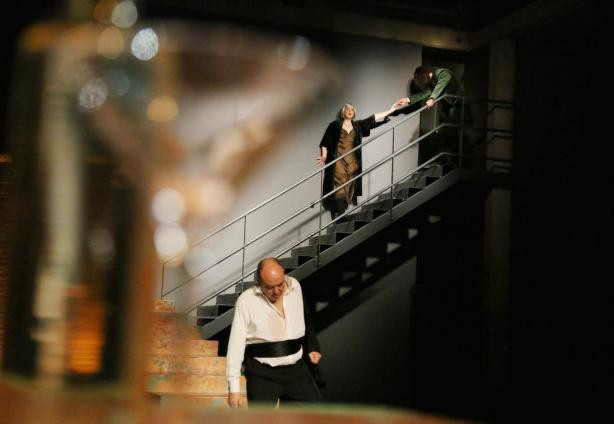The audience was reluctant to leave the Théâtre National du Luxembourg last Saturday night. They lingered in the dim lounge and the bar crowded with others as eager to discuss the play as for a last drink. They didn’t want to make the decision to go and walk out on world created by just four or five actors... and three staircases. Although they could hardly believe it had been done. “Four of them? There was only four or five of them?”
The players in “Mister Paradise and other electrical Rare Electrical Things Between People” were perfectly cast, and yet they were ‘perfectly cast’ in five different one-act plays... so is that great casting or great acting or both? That was something else people did post-show, hanging on to the recent visions on stage like dreams just after waking--they praised it all, from the mother-of-all family show-downs to the high-heeled nurse plumping up pillows, played by director Anne Simon herself.
Before the show began there was quieter talk not yet animated by drama or drink. What are we in for? What kind of one-act plays had the author of “Cat on the Hot Tin Roof”, “The Glass Menagerie” and other hallmarks of the American stage written before he became famous? Were the plays, products of the 30s and 40s, still relevant... and were they any good? They soon had their answers. Yes, yes and yes.
The world in the plays was mad, bent on destruction, and yet young women loved poetry, young men loved women (and football), characters wrestled with wrong and right and tried to make decisions worth writing plays about. So is it the past or the present? Both. Tennessee Williams created characters who speak for us when they speak for themselves.
The words were there, but the director and the cast threw the switch that made those rare electrical things between people possible. The playbill doesn’t list who played which role--maybe there were a dozen people on stage, or maybe Mister Paradise and Lilly were played by themselves... but as far as we can tell, a big round of applause goes to:
Steve Karier as the poet who seems to have lost everything except his pride and standards, as the Fat Man whose ‘aspirin’ eases his pains but causes his wife’s and as the timid man who feels safest following orders…
Daron Yates as the amicable young athlete determined to get out of the hospital bed and onto the field, as the dashing romantic lover with persuasive passion, AND as the desperate and clever assassin…
Elisabet Johannesdottir as a young woman who finds a poem that sears into her soul, and then finds the poet, and as Lily, nearly ground down like a cigarette butt by her mother and society’s expectations, but whose inner fire will not be stubbed out…
and Christine Probst-Staffen, as the nurse who cannot prevent her patients’ leaving by choice or by fate, as the wife torn between being sensible and sensuous, and as the mother whose shock and disgust possess her body like spirits and make her move in serpentine ways.
Credit also to Lisa Überbacher and her team for the ingenious set that was perfect for creating anything from a hospital ward to cheap digs in New Orleans, or a gunman’s perch. They were characters with silent parts, delivering the message with impact. Lives, like stairs, go both up and down--it’s sometimes fate, but for Williams’s protagonists, which way you go depends on difficult decisions.
Your decision about which direction to take, however, is easy. Head to the TNL to see these five one-act plays while you can! Tickets are available for the final four performances on 16, 17, 21 & 22 January.
